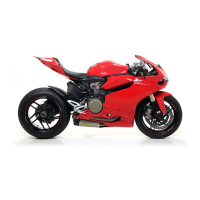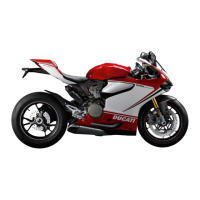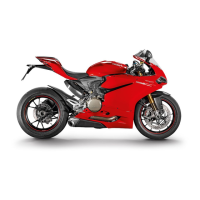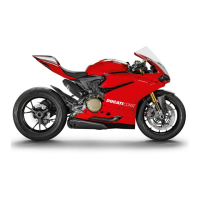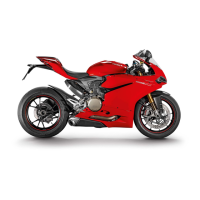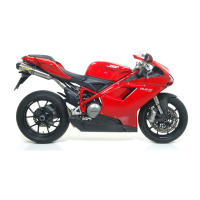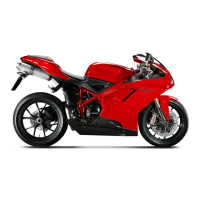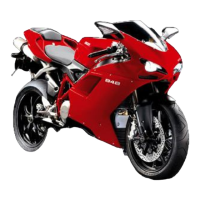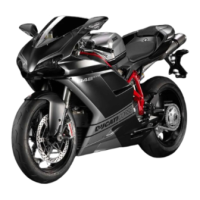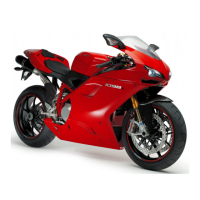Do you have a question about the Ducati superbike 899 panigale and is the answer not in the manual?
Emphasizes the importance of rider safety and responsible motorcycle operation.
Specifies that the motorcycle is for road use only on asphalt or paved surfaces.
Details requirements for riders, including licensing and avoiding impairment.
Explains emission control systems and potential problems affecting emissions.
Outlines the emission control system warranty specific to California.
Details the limited warranty for the motorcycle's emission control system.
Details the various indicators, lights, and display elements of the instrument panel.
Provides a list of acronyms and abbreviations used throughout the manual.
Explains key technological terms and systems used in the motorcycle.
Describes the function and operation of the handlebar control buttons.
Lists and explains the main and auxiliary functions displayed on the instrument panel.
Details the status display and operation of the Ducati Traction Control system.
Explains the Engine Brake Control system status and intervention levels.
Describes the status display for the Ducati Quick Shift system.
Explains the status display for the Anti-lock Braking System.
Details the display and range of the engine coolant temperature.
Guides on customizing engine, EBC, DTC, DQS, and ABS settings for each riding mode.
Explains how to display engine RPM in digital format for improved accuracy.
Details how to check the vehicle's battery voltage via the Setting Menu.
Covers enabling/disabling DDA and managing its stored memory.
Explains PIN code activation, entry, and changing procedures for security.
Guides on setting the time, hours, minutes, and AM/PM indication.
Describes how to adjust the instrument panel's backlighting intensity.
Covers enabling/disabling LAP recording, displaying, and erasing stored laps.
Explains how to change units for speed, temperature, and fuel consumption.
Details low/high beam switching and replacing headlight bulbs.
Explains turn indicator reset, parking lights, and hazard function operation.
Describes the immobilizer system keys, their functions, and operation.
Explains using the PIN code to temporarily restore vehicle operation.
Illustrates the location and identifies all motorcycle controls.
Details ignition switch, left/right switches, clutch, and throttle.
Explains rear brake pedal, gear change pedal, and their position adjustments.
Identifies key components like fuel tank plug, seat lock, side stand, and steering damper.
Guides on adjusting front fork and rear shock absorber settings.
Provides guidelines for the engine break-in period to ensure longevity.
Lists essential checks to perform before riding for safety and damage prevention.
Explains ABS functionality, braking techniques, and system deactivation.
Details the procedure for starting the engine and moving the motorcycle.
Describes how to safely stop the motorcycle and park it.
Provides instructions and warnings for removing motorcycle fairings for maintenance.
Guides on checking and topping up coolant, brake, and clutch fluid levels.
Explains how to check brake pad thickness for wear and replacement needs.
Details procedures for charging and maintaining the battery, including winter storage.
Covers checking drive chain tension and lubrication procedures.
Guides on replacing headlight bulbs, rear turn indicators, and beam setting.
Provides information on tubeless tires, pressure, tread depth, and replacement.
Explains how to check the engine oil level using the sight glass.
Details oil viscosity recommendations and spark plug maintenance.
Provides instructions for cleaning the motorcycle and proper storage procedures.
Lists scheduled maintenance operations to be performed by an authorized dealer.
Lists scheduled maintenance operations that the customer can perform.
Provides overall weight and dimension specifications for the motorcycle.
Lists the types and capacities of fluids required for top-ups.
Details the engine's bore, stroke, displacement, power, and torque.
Describes the motorcycle's double overhead camshaft (DOHC) timing system.
Provides maximum speed and performance data related to running-in and servicing.
Details the fuel system components and specifications.
Specifies the front and rear brake system details, including ABS.
Explains the wet clutch, gearbox, and gear ratios.
Covers specifications for the frame, wheels, tires, and suspension systems.
Details the exhaust system layout and available color schemes.
Outlines electrical components, lighting types, and fuse box information.
| Displacement | 898 cc |
|---|---|
| Transmission | 6-speed |
| Frame | Monocoque aluminum |
| Rear Brakes | 245 mm disc, 2-piston caliper |
| Power | 148 hp (110 kW) @ 10, 750 rpm |
| Torque | 99 Nm (73 lb-ft) @ 9, 000 rpm |
| Dry Weight | 169 kg |
| Wet Weight | 193 kg (425 lb) |
| Seat Height | 830 mm |
| Front Suspension | Showa 43 mm USD forks |
| Rear Suspension | Sachs monoshock |
| Front Brakes | Dual 320 mm discs, radially mounted Brembo Monobloc M4-32 calipers, 4-piston |
| Fuel Capacity | 17 liters |
| Electronics | Ducati Traction Control (DTC), Ducati Quick Shift (DQS), ABS, Riding Modes |
| Engine | Superquadro L-twin cylinder, 4 valve per cylinder, Desmodromic, liquid cooled |
